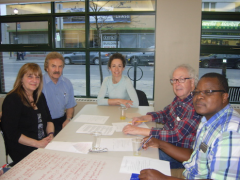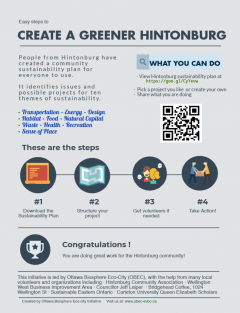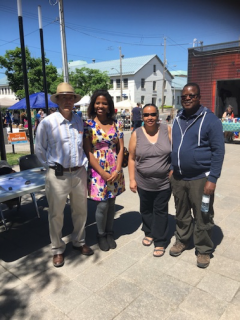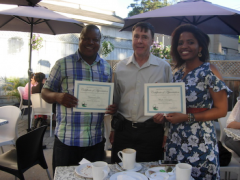During QES’s mobility period myself and my colleague, Chimwemwe Soko, were paired with the Ottawa Biosphere Eco-City (OBEC). OBEC is a non profit organisation which aims at instilling a culture and lifestyle of sustainable use of the environment at personal, family, community and even national level. OBEC operates guided by nine themes of Sustainability:  transportation, energy, design, habitat, food, natural capital, waste reduction, health, recreation and sense of place. I will provide a brief explanation on each of the themes and how OBEC uses each to tackle sustainability issues.
transportation, energy, design, habitat, food, natural capital, waste reduction, health, recreation and sense of place. I will provide a brief explanation on each of the themes and how OBEC uses each to tackle sustainability issues.
- OBEC seeks to make communities aware of transportation systems that will encourage sustainability of the environment in the long term.
- Regarding energy, OBEC seeks to make people aware of how various energy sources impact the environment and also enables people to adopt practices which will enhance sustainability.
- Design, as a theme, is thought of in terms of the built environment. OBEC believes that positioning, material selection and functionality should reflect the desire to cause the least harm to the environment and to the people who use it.
- Habitat is thought of in terms of the air, water and land environment, these need to be used in a way that will secure their usefulness even in the future.
- Sustainability under the theme of food, seeks to enhance food production methods that will foster sustainability given the fact that there is pressure in food production to match an ever-increasing demand for food production in the world.
- Natural capital is the potential of natural elements to meet human needs. To ensure sustainability of natural capital OBEC seeks to make communities aware so that they preserve soils and protect waterways sustainably.
- The theme waste reduction aims at encouraging communities to reduce, reuse and recycle wastes whenever they can. It also encourages communities to sort their wastes before trashing them.
- Health, as a theme, is directly linked to the quality of the water, air and soil. Preserving these will in some way secure a healthy community and also reduce other costs.
- There are various activities and endeavours where people seek to have fun and relax with friends and family. Communities can enhance forms of recreational activities, like frisbee, horseback riding, that bring pleasure and bring the least harm to the environment.
- Sense of place, as one of the themes, refers to belonging, sense of community and stewardship that community members have towards a given area. OBEC believes that people feel they belong when their neighbourhood or city meets their needs and they interact with other community members. Some sites can inspire a sense of place and this feeling often leads to greater stewardship of the environment which in the end leads to sustainability.
OBEC works with people from different backgrounds and occupation; students, accountants and many more. The organisation targets community members, especially young people from elementary and high school. This is because OBEC believes that when the youth are trained and made aware of sustainability culture, they will carry it on to adulthood and thus Ottawa will be a sustainably managed city. More information is found on their official website: obec-evbo.ca, additional information on what they have done and some that are still underway, can be found at the following websites: www.maisontuckerhouse.ca , www.otesha.ca , www.capitalvelofest.ca , www.cog.ca/ottawa and infostw.org/ottawa. In the near future, OBEC seeks to carry out and establish Sustainability-culture hubs even outside of Canada and identified Malawi as one such area considering that my colleague Chimwemwe and I are already in Malawi and we have worked with OBEC and shared materials before.

Figure 1: Alinafe (second from right) in community discussion on Energy
As part of the program we were involved in various activities with OBEC. Such activities included holding meetings with community members, attending council meetings with OBEC’s executive committee, carrying out surveys, managing data and drafting reports and attending fun fairs where various people and organisations displayed their works to the entire community. Our participation in the various activities was very flexible: depending on the activity, we would work on our own and according to our schedule while at other times we worked together with the entire team.
We conducted many activities together with OBEC’s team, here I will share only two of them. One of the activities was the Hintonburg Sustainability Project. The project aimed at first making the community aware of OBEC and its purpose of instilling sustainability culture; secondly, to train facilitators (who were mostly volunteers) to guide the community members in choosing and carrying out small projects of their desire; thirdly, to carry out community meetings with the community members; fourthly, to help the community members organise themselves in establishing committees of their own to monitor their various projects so that even after the project was finished in Hintonburg, the community would still carry it on.
Ten facilitators were trained and Chimwemwe and I were part of the team of facilitators being trained. Most of the facilitators were from Hintonburg, this was strategic, as people sometimes

Figure 2: Chimwemwe (first from right) in Hintonburg community discussion on Transportation
respond better to activities where there are local and familiar faces. After the training, word was sent out to the community through the facilitators themselves, posters, OBEC’s website, local newspaper and other channels. The awareness and choosing of projects meeting was done for two days in the evenings from 7 to 8 pm. Cumulative attendance for the two days was 45 people (which we considered encouraging considering how people are).
After being made aware, the community members chose small doable projects guided by the nine themes. The attendees who were interested in being contacted later left their email addresses per our request. By the time we were leaving for Malawi at the end of the mobility period, the community members were contacted and OBEC facilitated a community meeting with the interested community members. We continue to link with OBEC and we have recently been updated that the Hintonburg community members who participated in the 2-day meeting are now working towards implementing the projects. They have developed posters which are being circulated to encourage their community member to engage in various projects of their choice, which were developed earlier.

Figure 3: Poster for Hintonburg community

Figure 4: Jim, Alinafe, Colleen and Chimwemwe Arts Park showcase fair
Another one of the activities we did with OBEC was taking part in a fair which occurred in Hintonburg community. Community members, organisations and various artists were showcasing their best works. OBEC took an opportunity to also showcase its various activities including the Hintonburg Sustainability Project. The timing was perfect since the showcase closely followed the meeting we had with some of its members during the 2-day meeting. My colleague Chimwemwe and I were also part of it. We were privileged to interact with various people and organisations including one of the people contesting in the past elections.

Figure 5: Jim, Alinafe, Chimwemwe and Colleen at Arts Park showcase
At the end of our stay OBEC’s chairman, Jim Birtch, prepared a farewell meal where we were presented with certificates of appreciation. To this day, we remain in contact with OBEC.

Figure 6: (From left) Chimwemwe, Jim and Alinafe with certificates